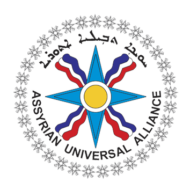Statement on the Meaningful and Effective Participation in Economic and Development
Policy-Making
Ms. Jennifer Babaie, AUA Committee on International Relations:
On October 31st of this year, the Our Lady of Salvation Cathedral was holding its usual Sunday evening mass. Armed men carrying explosives and weapons forcefully entered the church and killed 2 priests and at least 50 of the worshippers. It took more than four hours and four dead security guards before the remaining hostages were freed.Good morning everyone. My task today is to explain centuries of entrenched discrimination against an entire nation and its needs in the face of such discrimination in less than 90 seconds. Let us begin:
Also known as Chaldeans and Syriacs, Assyrians are an indigenous people who have resided in the area now known as modern day Iraq for more than 2 millennia. Since 2003, we have represented 20-30% of the Iraqi refugee population fleeing to Syria and Jordan while making up only 3-5% of the population. Due to this, our numbers in Iraq are now half of what they once were. And though it is not anyone’s favorite topic, the conflict has not yet stopped. As with every attack on an Assyrian institution within the country, the incident on the 31st, occurring only 6 weeks ago, has led to thousands of Assyrians fleeing from Baghdad to the Nineveh Plains in northern Iraq.
In Nineveh one can find many of our ancient villages and towns. A closer look will show u a shriveled economy, a lack of development, small or shut down schools, and almost no employment options for the displaced. Unable to survive, these families take the next logical step – they flee Iraq for Syria and Jordan, hoping to return to a more secure home in the near future. Awaiting resettlement, these families also face dire economic conditions, living without the right to work and their children without the right to a full education.
Currently pre-occupied with our basic safety and historically forced to diminish our ethnic identity, Assyrians have become marginalized members of their community. Because as the rest of the country participates in government elections, development of businesses, and the reconstruction of their nation’s infrastructure, Assyrians stand on the side-lines, in fact, they are not even on the same field.
The draft recommendations of the UN Human Rights Council we have before us include many resolutions we hope to apply to our own communities, especially the affirmation that all governments should implement special measures to address the effects of long-standing discrimination on minority groups. The Iraqi Constitution already has provisions supporting this in Articles 16 and 41, but implementation has been lacking.
To truly be able to participate in dialogue and decision-making, we call upon the international community for the following:
1.) Pressure on the Iraqi Government to create an independent authority in charge of compiling quantitative data for the socio-economic factors effecting Assyrians and other minorities in Iraq. This data will allow for informed legislature and directed investments on behalf of the Assyrians and the territories they live in.
2.) As put forward by the Nineveh Center for Research and Development yesterday morning, we too request a visit by the independent expert on minority rights to the Nineveh Plains to witness the currentcondition of the area.
3.) Vocal pressure on the government of Iraq to materialize another promise within its constitution, the rights of indigenous groups in Iraq to self-determination and self-governance on their personal status. These measures combined will create pull factors, encouraging Assyrians to remain in Iraq or to return if they have not yet left the region.
The Independent Chair Ms. McDougall rightly stated Monday afternoon that no one can do this work for us, we must help ourselves. We firmly believe change can never be made permanent without internal support and activism, but we are beseeching the international community to realize we have come to a point where we need your help and your support to get back our voice. We need your help to move from a community perceived as obscure and ancient to one that is viable, respected and influential.

